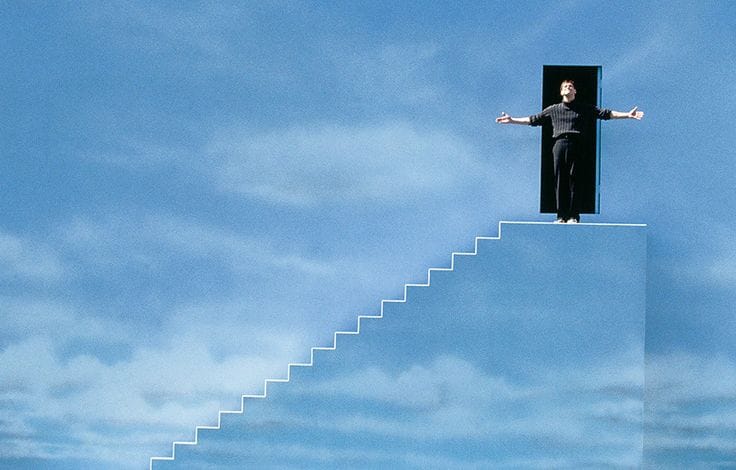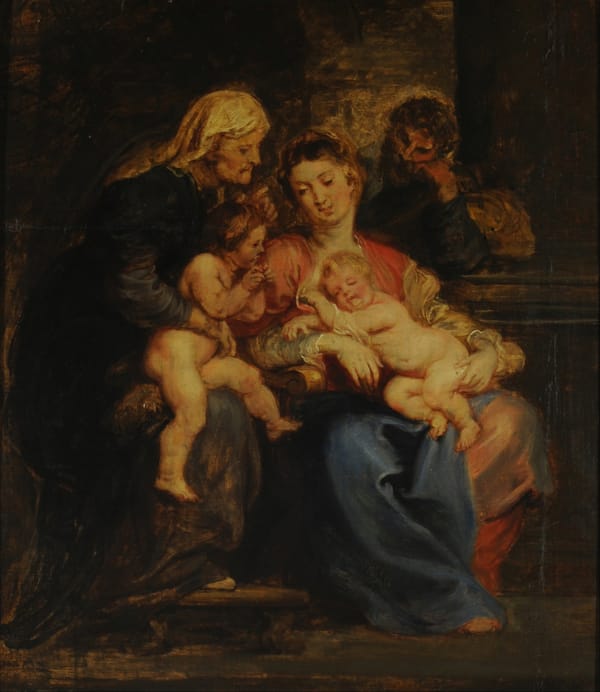The Prescience of The Truman Show
Nearly 30 years after its release, The Truman Show has only grown in relevance, as everyone has come to join Truman as products trapped in a false world.

The Truman Show was not just a speculative fiction, it was a prophecy.
The 1998 classic, directed by Peter Weir and written by Andrew Niccol, admits of many interpretations: as a satire of the movements towards so-called realism in art and in particular the rise of reality TV, as one of the many films from the late 1990s to express consternation with the prison-like stasis of post-Cold War American life, as an exploration of humanity’s god complex. Among the most apparent, though, is as a version of Plato’s Allegory of the Cave, where Truman acts as the prisoner, escaping from his false impression of reality and discovering the world as it really is. Plato’s Cave cropping up in art is nothing new; the image has been invoked for millennia in myriad contexts wildly separate from its original function as an explication of the metaphysics of intelligible forms.
But expressing it through the story of a man coming to realize his entire life is a TV show seems poignant for our current age, and more than a quarter century past its release the film has only grown in relevance. It anticipated the increasing commercialization of art, and the degree to which commercial control is at odds with creativity, something today’s artists should be especially wary of. Even further, though, it is striking to consider when revisiting the film today whether we are all trapped inside our own Truman Shows, in solipsistic bubbles where we are sedated by the larger forces of capital and made vehicles for profit.
The film begins with interview clips from Christoph, the show’s godlike creator, and its lead actors, all attesting to the idea of The Truman Show being real life, free from the artifice of television. (For clarity, by the way, when The Truman Show is italicized in this article it refers to the film itself, and when it is not italicized it refers to the fictional television show on which the film focuses.)
But of course, the “real life” the show claims to present is entirely a fabrication. Not just because it occurs in a gigantic dome with computer-controlled sunlight and weather where everyone acts based on directions from an earpiece, but in a much deeper sense, because Truman’s life is scripted from the outset. Everything is pre-determined: what job Truman will have, who his friends will be, whom he will marry. The aim of The Truman Show is not to follow a real person as he goes about his life, it is to get Truman to live a specific kind of life, one which the show is trying to sell. When the show gets its audience to buy into the idea that it is presenting real, regular life, it gets the immense and very monetizable power to determine what real, regular life looks like. For The Truman Show, that is small-town Americana life with a cubicle job and a heterosexual marriage, and everything within that “regular life” – the clothes everyone wears, the houses they live in, the food they eat – is literally for sale. The Truman Show is not real life, it is an advertisement, and in the eyes of Christoph and the show’s producers, Truman is not a person, he is a product.
As a product, Truman must be controlled. He must be kept in his little box, both the literal box that constitutes his world and the figurative box of the life Christoph has laid out for him. He cannot be allowed the free will to try anything new or unknown, because that would mean a loss of control for Christoph over the narrative the show is selling. Truman’s life must be predictable, as predictability equals profit. So the mechanisms of Truman’s world all serve to coddle him, to keep him sedate in his office job and little seaside town and unfulfilling marriage, to prevent him from exercising any self-determination.
In order to make money, the restrictions are necessary, but if Christoph’s real aim is to turn Truman’s life into a great work of art, then they are debilitating. They cut off all of the potentially interesting directions of Truman’s life in favor of the marketable one. Great art often pushes boundaries, and this is often incompatible with being predictably profitable. Most artists will at some point have to make a choice between the artistic integrity of their work and their ability to monetize it, between doing something interesting or becoming propaganda for the status quo. The Truman Show exemplifies the latter, as has much art throughout history.
Now, the life Christoph keeps Truman trapped in does not look so bad, and his explicit incursions to prevent Truman from straying from that life are relatively few prior to Truman’s outright rebellion, but consider how much further Christoph might have gone to keep Truman boxed in under different circumstances. What if Truman had turned out to be gay or transgender? Would the producers have accepted that and adapted their plans for the show around his identity? Or, more likely, would they have done everything in their power to prevent Truman from discovering these facets of himself, because it’s easier to draw advertisers with a straight, cisgender lead? Christoph and the show’s producers have no real interest in giving Truman a happy, fulfilling life. Their interest is in making Truman live the life that is beneficial to them, not him, and doing as much as they can to keep him satiated in that life so he does not rebel against it.
It is this feature of The Truman Show, that of people made products by large corporations which sedate them into a controlled life for the sake of profit, that now runs even more rampant in our world. We are not literally living inside Truman Shows, in giant domes serving as television sets where everyone we know is an actor and our lives are being broadcast to an audience we do not know about. (Or who knows, maybe we are.) But we do all live much of our lives in a false world where we are the profit engines for corporations. I refer to the digital world of our phones and computers, where you are reading this article right now.
What we experience in our world of websites, chatrooms, and social media apps is not real life but a facsimile of it, shadows on the wall of the cave. Rather than actually talking with people we leave comments on internet forums. Rather than actually going outside we look at pictures of nature on Instagram. These activities have some resemblance to real life, real experience, but they are no substitute for it. Just as Truman’s life is manipulated to keep him believing in the lie, we are manipulated to keep living in our false digital world. We do not have control rooms of technicians and television directors doing this, but algorithms which manipulate our digital worlds entirely around us, whose sole purpose is to keep us scrolling and clicking, to keep us engaged in a false reality. They aim to sedate us, to give us just enough stimulation that we stay online, so that they continue to control us, predict our choices, and turn us into a vehicle for profit.
A key point to note about The Truman Show is that there are really two Truman Shows: the one that is being put on for Truman, which keeps him under control in his ordinary life, and the one for those watching Truman on TV, which is trying to figuratively sell them the idea of Truman’s life and literally sell them all the things within it. In our Truman Show of the digital world, we find ourselves trapped in both shows at once. We are both Truman, trapped in a false world that makes us a product, and the audience of The Truman Show, our media feeding us a vision of what a decent life looks like which it can then sell us. The algorithms that serve as the Christophs for our Truman Shows keep us on a hamster wheel: they draw us into their false reality and isolate us from everything else, they control and manipulate our behavior to get us to want a certain type of life, then they sell a digital facsimile of that type of life back to us, which satisfies us just enough that we stay locked into the false reality where they continue to control us. We gain no real happiness, only an unending desire for it, while the corporations that produce our Truman Shows gain total control over us and all the profit that comes with it.
One side effect of our tranquilization inside digital Truman Shows is the suppression of provocative art. The more our algorithm-lords can lull us into a false reality that they control, the harder it becomes to create work that breaks conformity with it. Artists will not find the tools to liberate themselves and their peers from their digital stupor within the soma that maintains that stupor. What we need more of today is art that aims to shock rather than to satisfy, that hurls us violently into reality instead of giving us a lullaby in the cave. The algorithm-lords seek profit. Profit comes from predictability, and predictability is best achieved through conformity. Defiant non-conformity, then, is our best weapon against the Christophs of the world.
In a way, the interviews that begin the film with Christoph and the show’s actors professing that The Truman Show is totally real ended up being right. It’s just that The Truman Show didn’t become real life, real life became The Truman Show. People began living more and more of their lives in a false world that revolved around them, that increasingly distanced them from real interaction with other people, that sought to sedate them just enough to keep them from leaving and to control them so that they would become vehicles for profit. The question then becomes whether we can escape, make our way out of the cave and into the real world above. On this matter the film provides conflicting answers for its two Truman Shows. Truman himself escapes; he rejects his false world and famously bows out into the real one. But this is not actually how the film ends. It ends with a brief scene just after that, when, once the show has cut transmission, the two guys in the garage who have been among the many intently watching the show throughout the film flippantly change the channel to see what else is on. The audience does not escape; they remain addicted to the false reality of the television and the visions of life it is selling them. Truman has escaped the cave, but he will soon find himself in a world of people chained up in their own caves staring at shadows on the wall. The film leaves it open what happens from there, but those familiar with Plato’s allegory will know that when the enlightened prisoner travels back into the cave to try to free the others, it does not go so well.
The Art Newsletter
Creativity. Culture. Community.
Every Thursday, we send a carefully curated drop of stories, tools, and creative insight for the next generation of artists, musicians, filmmakers, designers, and thinkers.
From cultural commentary to personal reflections, viral trends to overlooked gems. We cover what’s happening and what matters. Want local updates too? Join our Austin list for events, meetups, and opportunities.





